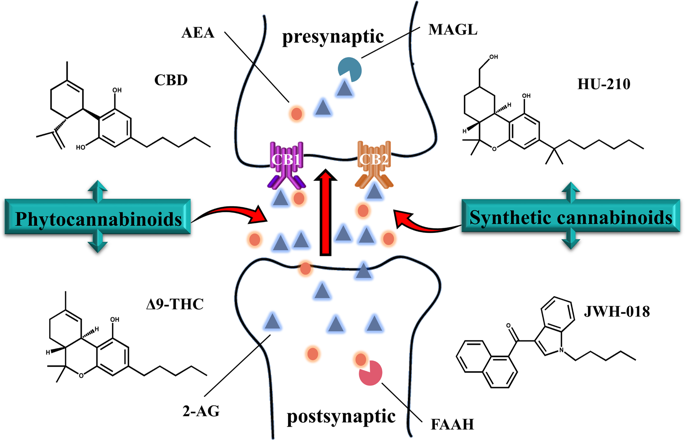Acta Pharmacologica Sinica ( IF 6.9 ) Pub Date : 2020-03-18 , DOI: 10.1038/s41401-020-0385-7 Si-Yu Ren 1 , Zhen-Zhen Wang 2 , Yi Zhang 3 , Nai-Hong Chen 1, 2

|
The endocannabinoid system (ECS) has received extensive attention for its neuroprotective effect on the brain. This system comprises endocannabinoids, endocannabinoid receptors, and the corresponding ligands and proteins. The molecular players involved in their regulation and metabolism are potential therapeutic targets for neuropsychiatric diseases including anxiety, depression and neurodegenerative diseases such as Alzheimer’s disease (AD) and Parkinson’s disease (PD). The inhibitors of two endocannabinoid hydrolases, i.e., fatty acid amide hydrolase (FAAH) and monoacylglycerol lipase (MAGL), have the capacity to increase the level of endocannabinoids indirectly, causing fewer side effects than those associated with direct supplementation of cannabinoids. Their antidepressant and anxiolytic mechanisms are considered to modulate the hypothalamic-pituitary-adrenal axis and regulate synaptic and neural plasticity. In terms of AD/PD, treatment with FAAH/MAGL inhibitors leads to reduction in amyloid β-protein deposition and inhibition of the death of dopamine neurons, which are commonly accepted to underlie the pathogenesis of AD and PD, respectively. Inflammation as the cause of depression/anxiety and PD/AD is also the target of FAAH/MAGL inhibitors. In this review, we summarize the application and involvement of FAAH/MAGL inhibitors in related neurological diseases. Focus on the latest research progress using FAAH/MAGL inhibitors is expected to facilitate the development of novel approaches with therapeutic potential.
中文翻译:

内源性大麻素系统药物在神经精神疾病和神经退行性疾病中的潜在应用-重点研究FAAH / MAGL抑制剂
内源性大麻素系统(ECS)因其对大脑的神经保护作用而受到广泛关注。该系统包含内源性大麻素,内源性大麻素受体以及相应的配体和蛋白质。参与其调节和代谢的分子参与者是神经精神疾病的潜在治疗靶点,包括焦虑症,抑郁症和神经退行性疾病,例如阿尔茨海默氏病(AD)和帕金森氏病(PD)。两种内源性大麻素水解酶的抑制剂,即脂肪酸酰胺水解酶(FAAH)和单酰基甘油脂酶(MAGL),具有间接提高内源性大麻素水平的能力,与直接添加大麻素相关的副作用相比,其副作用较小。他们的抗抑郁和抗焦虑机制被认为可以调节下丘脑-垂体-肾上腺轴并调节突触和神经可塑性。就AD / PD而言,用FAAH / MAGL抑制剂治疗可减少淀粉样β蛋白沉积并抑制多巴胺神经元的死亡,这通常被认为分别是AD和PD发病的基础。作为抑郁症/焦虑症和PD / AD的原因,炎症也是FAAH / MAGL抑制剂的目标。在这篇综述中,我们总结了FAAH / MAGL抑制剂在相关神经疾病中的应用和参与。预期使用FAAH / MAGL抑制剂的最新研究进展将促进具有治疗潜力的新方法的开发。用FAAH / MAGL抑制剂治疗可减少淀粉样β蛋白沉积并抑制多巴胺神经元的死亡,而这通常分别被认为是AD和PD发病的基础。作为抑郁症/焦虑症和PD / AD的原因,炎症也是FAAH / MAGL抑制剂的目标。在这篇综述中,我们总结了FAAH / MAGL抑制剂在相关神经疾病中的应用和参与。预期使用FAAH / MAGL抑制剂的最新研究进展将促进具有治疗潜力的新方法的开发。用FAAH / MAGL抑制剂治疗可减少淀粉样β蛋白沉积并抑制多巴胺神经元的死亡,而这通常分别被认为是AD和PD发病的基础。作为抑郁症/焦虑症和PD / AD的原因,炎症也是FAAH / MAGL抑制剂的目标。在这篇综述中,我们总结了FAAH / MAGL抑制剂在相关神经疾病中的应用和参与。预期使用FAAH / MAGL抑制剂的最新研究进展将促进具有治疗潜力的新方法的开发。作为抑郁症/焦虑症和PD / AD的原因,炎症也是FAAH / MAGL抑制剂的目标。在这篇综述中,我们总结了FAAH / MAGL抑制剂在相关神经疾病中的应用和参与。预期使用FAAH / MAGL抑制剂的最新研究进展将促进具有治疗潜力的新方法的开发。作为抑郁症/焦虑症和PD / AD的原因,炎症也是FAAH / MAGL抑制剂的目标。在这篇综述中,我们总结了FAAH / MAGL抑制剂在相关神经疾病中的应用和参与。预期使用FAAH / MAGL抑制剂的最新研究进展将促进具有治疗潜力的新方法的开发。











































 京公网安备 11010802027423号
京公网安备 11010802027423号